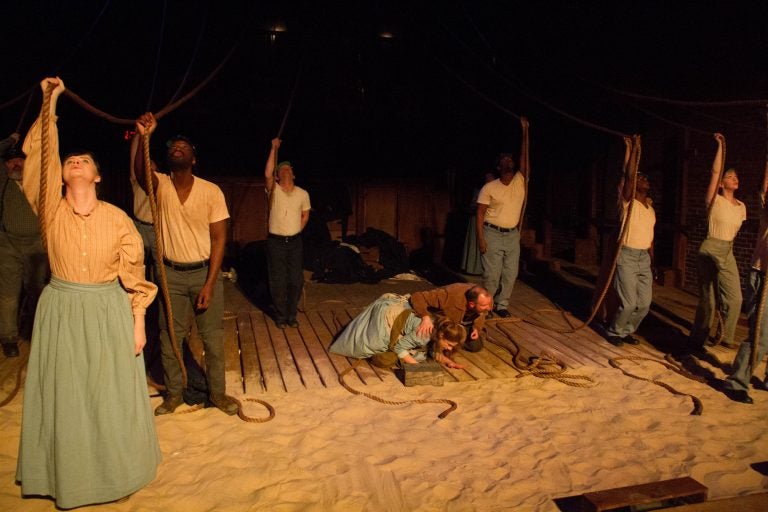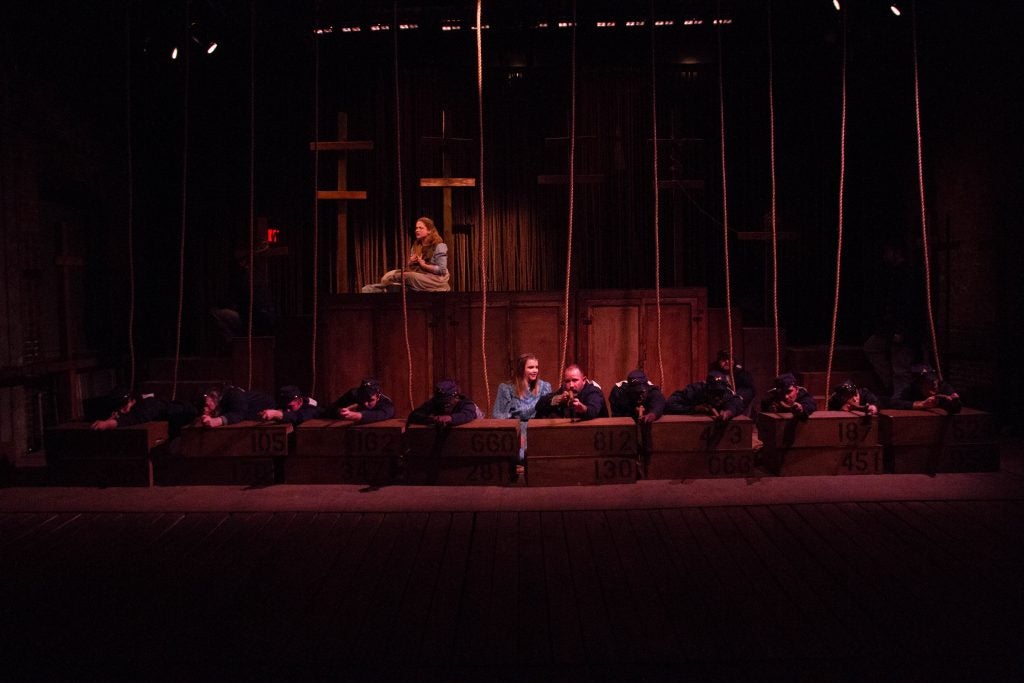Small Philly theater company takes on big play cycle
Where no theater has gone before: EgoPo takes on John Guare's 'Lydie Breeze' trilogy.
Listen 3:24
The cast of EgoPo Classic Theater's Lydie Breeze Trilogy Part One. In the Center is Melanie Julian as Lydie Breeze, Charlie DelMarcelle as Joshua. (Dave Sarrafian)
A small Philadelphia theater company is taking on a big project: EgoPo, a company that specializes in reimagining classical theater, is producing the “Lydie Breeze” trilogy. The works will be presented back-to-back for five months, culminating in May with a nine-hour performance of all three in one day.
This is the first time the complete play cycle by John Guare will be staged altogether.
The plays are set during and after the American Civil War, where a nurse named Lydie Breeze witnesses the horrors of battle. The first part, “Cold Harbor,” is the largest, requiring more than 20 performers to stage field battles and act as a chorus.

The actors perform all the music onstage throughout the trilogy.
In “Aipotu,” set after the war, Lydie convinces a handful of friends to retreat to Nantucket Island in Massachusetts and form a self-reliant utopian society. The title of the play is the word utopia spelled backwards.
The third play, “Home,” traces the next generation — including Lydie’s daughter — trying to recover from the fallout of that utopia.
The plays were written and staged individually in the 1980s to mixed reviews. At the time, Guare had had critical hits with “House of Blue Leaves” and the script for the Louis Malle film “Atlantic City.” The play he would become best known for — “Six Degrees of Separation” — was still ahead of him.
Guare wrote the plays in reverse order, with different names. The first, “Lydie Breeze,” had characters with such complicated backstories that the cast kept asking Guare to explain them. So he wrote a prequel, “Gardenia.”
Then it happened again: The cast of “Gardenia” asked Guare to explain how their characters evolved. So he wrote another prequel, “Women and Water.”
“The scripts are always in flux,” said Lane Savadove, artistic director of EgoPo. “Each has been through two different publication versions and name changes.”
“Lydie Breeze” became “Home.”
“Gardenia” became “Aipotu.”
And “Women and Water” became “Cold Harbor.”
When these plays premiered, critics were scratching their heads wondering what Guare was doing messing around in the Civil War.
“Being born in New York and writing in New York, I was drawing on the same material a lot of people were drawing on,” said Guare, during a visit to Philadelphia to sit in on a rehearsal. “I wanted a world that was completely mine, that nobody else knew about.”
“My parents were born in the 1890s, and I wondered what life was like for them. I loved Nantucket. It was a savior for me in the 1970s. It got me out of town,” he said.
“Nantucket is a place you go to change your life — at least it was then, before it became a hedge-fund, billionaire mecca.”
No one has ever tried to produce all three plays at once. The complexity and cost of the first play, with its large-scale battle scenes and two dozen characters, put off most theater companies. Because EgoPo is a small theater company with just two full-time employees, it would not have been able to take on the trilogy without the support of the Pew Center for Arts & Heritage.
The play cycle has a champion in Savadove, who once worked as Guare’s assistant in the early 2000s.
“When I got to the ‘Lydie Breeze’ plays, I realized there was this hidden treasure,” he said. “The great American epic everyone has been waiting for is sitting right there, waiting to be done.”
Savadove believes to truly appreciate the plays, you have to see all of them; only then can the cycle reveal its scope and depth. He says the meaning of the third play is revealed after the audience has been through the epic adventure of the first and the psychological realism of the second.
“That tripartite journey is the internal journey of the main character — Joshua, who is in all three plays — who has to go through a journey of finding out what his legacy is on Earth,” said Savadove.
After staging one play a month in February, March, and April, EgoPo will present the three parts over three consecutive evenings.
Then, for the hardy, all three will be staged as a marathon nine-hour performance (with breaks) in one day.
WHYY is your source for fact-based, in-depth journalism and information. As a nonprofit organization, we rely on financial support from readers like you. Please give today.





